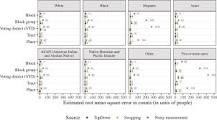
A small team of political scientists, statisticians and data scientists from Harvard University, New York University, and Yale University, has found that by switching to a new method to better protect privacy, the U.S. Census Department has introduced factors that reduce accuracy in some cases.
In their paper published in the journal Science Advances, the group describes how they analysed a file provided by Census officials to measure accuracy in publicly available census data and their results.
Prior to the 2020 U.S. census, officials with the U.S. Census Bureau worried about the privacy of the people who provide answers to the census, opted to change the method by which they ensured data security.
The old method was called, “swapping.” It involved swapping data from people living in one block of a city with people in another block, thereby preventing people from being identified based on their data. The new method is called “differential privacy” and it involves adding what the Bureau describes as “noise” to each piece of data that is collected.
In this new effort, the research team could find no instance of an outside entity conducting research to determine if the new method did indeed provide more privacy or if the processed data was more or less accurate than had been the case when swapping was used. So, they began one of their own.
The study began with the research team asking the Census Bureau to give them access to what is called the noisy measurement file (NMF)—the one used for the 2020 census. The Bureau denied the request, which led the team to sue them. Eventually, the lawsuit was dropped when the Bureau agreed to give the team the NMF associated with the much smaller 2010 census—one that was carried out as a way to test the new method, and involved both swapping and differentiating.
The researchers then analysed that file as a way to study the impact on accuracy of changing to the new system. In so doing, they found that overall, the two systems provided roughly equal accuracy on a broad scale. But they also found evidence of a reduction in accuracy at the block level of a type that could adversely impact minorities and multiracial populations.
For more such insights, log into our website https://international-maths-challenge.com
Credit of the article given to Bob Yirka , Phys.org

